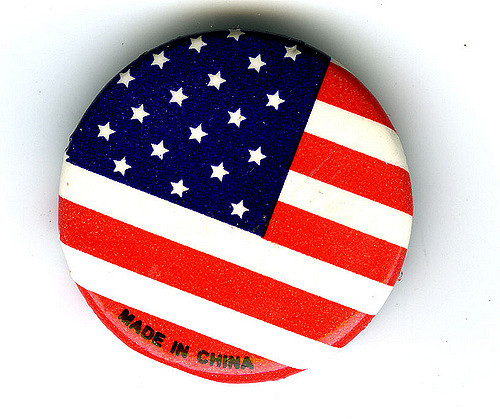
When I was ambassador to the United States, I used to say that Australia was allied to the US—minus one building in Washington. That building housed the United States Trade Representative (USTR). Along with the Department of Commerce and the relevant section of the National Security Council, USTR runs US trade policy. The building was once the headquarters of the Grand Army of the Republic, a veterans’ lobby organisation formed in 1866 after the American Civil War.
That spirit of a hard war still haunts the current occupants. Their concern for the American interest overshadows those of friends and enemies. ‘Win–win’ outcomes are slow to emerge and any retreat is glacial. DFAT sends hardened officers to staff our trade policy branch, but they bond with USTR staff in their adversarial relationship. Staff farewells with their American counterparts are tearful, sometimes fraught. My last social function with USTR had a winter frost around it as they thought we had forced a TPP package on them.
That’s a long way of saying that Trump, despite being the least prepared president in living memory, has tools to hand in the form of his departmental public servants as he prepares for hard bargaining with Xi Jinping. Last week USTR broke out the ammunition in its annual trade barriers report. For fair trade advocates, it’s a table of grievances. In recent years, it has informed speeches more than policies, though it has produced occasional hard anti-dumping measures.
This year the timing is impeccable for Trump, and it accompanied two presidential executive orders on trade issues, including the ordering of a new report on the cause of America’s trade deficits. Hilariously, Trump walked out of the signing ceremony in high dudgeon, pursued by his vice president waving the unsigned documents, after a press question. This year’s USTR report has a sharp focus on China for its catalogue of most notable offences. They cover alleged excess steel and aluminium production capacity, excess restrictions through its cybersecurity regime, forced technology transfers, online piracy, delayed approvals for agricultural biotechnology products, continuing bans on US beef imports, and obstacles facing US providers of electronic payment services.
Peter Navarro, head of Trump’s newly created National Trade Council, claimed Trump’s latest executive orders weren’t directed squarely at China, but rather were ‘a story about trade abuses’. Indeed, the focus was on uncollected anti-dumping duties of $2.8 billion since 2001 and measures to improve collection. Further, the US trade argument to this point has produced the most spectacular clash with Germany, rather than China. Germany is the real competitor of the US in high-end manufacturing. US trade officials could point to Germany, Japan and Mexico as similar targets to China. ‘You have to think about it this way: we are in a trade war … have been for decades’, Commerce Secretary Wilbur Ross said on CNBC’s Squawk Box last week.
On a recent visit to DC, I was asked by an official in the Executive Office Building what I thought of ‘the policy’. My response was that I couldn’t discern a policy. There were ‘attitudes and reactions’ and that dynamic might produce a policy. In trade policy, that process is now evident. Spokesmen like Navarro were at pains to point out the careful deliberation being put into developing the framework of the Trump executive orders. The National Security Council is learning from the experience of the failed immigration executive orders. Policy will be hardened 90 days from now, as the trade study is completed.
Accompanying Navarro’s broadening of the pain in the USTR report was Secretary of State Rex Tillerson’s extraordinary assurances in Beijing that Washington would be guided by the Chinese formula of ‘nonconflict, nonconfrontation, mutual respect and win–win cooperation’. The Chinese shouldn’t be fooled: Trump will come after the trade balance very hard with a reciprocity formula. Mercantilist Xi meet Nationalist Trump.
Trump will be looking for early steps to redress the trade imbalance—the merchandise trade deficit with China was close to $350 billion last year. Autos are a poster child for Trump. China levies a 27% tariff on US-origin vehicles and limits investment ownership in production plants in China to no more than 50%. That will not persist. The range of offences identified in the USTR report will be canvassed. Along with trade, US anger at what it sees as weak Chinese efforts in preventing North Korea’s nuclear developments will form the nub of the conversation in Mar-a-Lago this week. But US hardness will be checked by Trump’s desire to establish a personal relationship with Xi and the sense that trade policy is evolving.
On trade, Trump doesn’t lead a united Republican front. Kevin Brady, chairman of the powerful House Ways and Means Committee, criticised notions that the US trade picture was solely dominated by bad trading behaviour by partners, observing that ‘in fact our trade agreements have been successful in making it easier to sell ”Made in America” products and services, lowering and even eliminating our trade deficits in manufacturing and services and frequently resulting in a trade surplus’. The Republican congressional delegation, including the far right Freedom Caucus, is overwhelmingly pro-free trade. Attitudinally, Trump is their polar opposite.
Trade policy isn’t an area in which a quiet adjustment to current practice will evolve. Detail and knowledge will aid the development of a disruptive agenda. Regardless of whether there are fireworks at the Trump compound, the Chinese will have laid before them a determination to rebalance the stark bilateral trade deficit. Being well aware of that, Xi will bring a package. It will barely foreshadow a start on this road.

